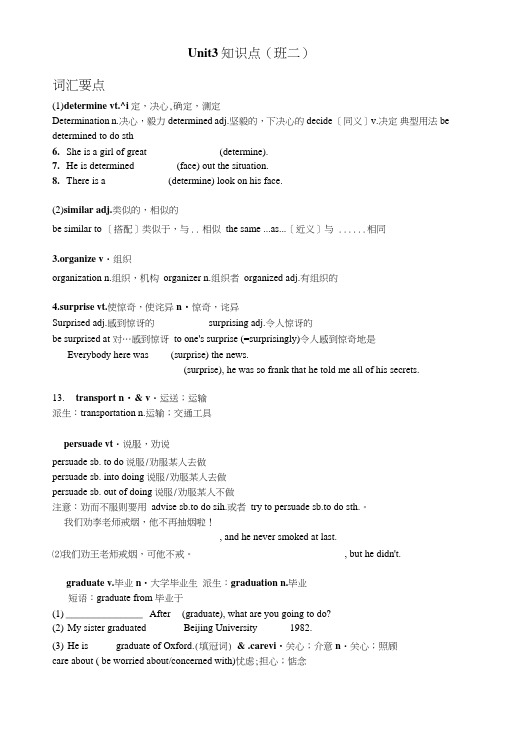高一英语人教版必修一unit3 语法doc资料
(精校版)人教版高中英语必修一Unit3知识点详解,推荐文档

(直打版)人教版高中英语必修一Unit3知识点详解,推荐文档(word版可编辑修改)编辑整理:尊敬的读者朋友们:这里是精品文档编辑中心,本文档内容是由我和我的同事精心编辑整理后发布的,发布之前我们对文中内容进行仔细校对,但是难免会有疏漏的地方,但是任然希望((直打版)人教版高中英语必修一Unit3知识点详解,推荐文档(word版可编辑修改))的内容能够给您的工作和学习带来便利。
同时也真诚的希望收到您的建议和反馈,这将是我们进步的源泉,前进的动力。
本文可编辑可修改,如果觉得对您有帮助请收藏以便随时查阅,最后祝您生活愉快业绩进步,以下为(直打版)人教版高中英语必修一Unit3知识点详解,推荐文档(word版可编辑修改)的全部内容。
Part 1. Warming up1、Which kind of transport do you prefer to use: bus or train?prefer 宁愿;更喜欢用法:(1) prefer + n。
/ pron。
The boy preferred a detective story.(2) prefer + v。
-ing Do you prefer living abroad?(3) prefer + to do She prefers to live among the working people。
(4) prefer sb. to do sth. She preferred him to stay at home.(5) prefer + n. / pron. / doing + to + n. / pron. / doing 喜欢……而不喜欢I prefer the town to the country.While he was in the office he preferred doing something to doing nothing。
最新人教版高一英语必修一Unit-3-语法知识分享

Homework:
• Page 21 on your book: exercise 2
Thank You!
L/O/G/O
此课件下载可自行编辑修改,仅供参考! 感谢您的支持,我们努力做得更好! 谢谢!
人教版高一英语必修一Unit-3-语法
REVIEW
主语+be +v-ing形式
I
I → am He → is She → is
It → is We → are They → are You → are
Listen! She ilsislistteennisng to the music. We are ppllaayyitnhge basketball.
③ be to+动词原形:表示按计划要发生的事 或征求对方意见。 Are we to go on with this work?
④ be about to+动词原形,表示即将发生 的动作,不与表示将来的时间状语连用。
I was about to go swimming when my guide shouted at me and told me not to do so. 我正要去游泳, 这时向导大声叫我不要 去。
⑤ 一般现在时表示将来时 (1) 按规定预计要发生的未来动作,仅限于
动词come, go, leave, move, start, return, arrive, begin, stay等动词. The plane takes off at 10:10. That is, it’s leaving in ten minutes.
(2) 用在状语从句中用一般现在时代替将来时。 If you do that again, I’ll hit you.
人教版高一英语必修一Unit-3-语法

(2) 用在状语从句中用一般现在时代替将来时。 If you do that again, I’ll hit you.
(3) 用在I bet 和I hope后面, 常用一般现在时 表将来。 I bet you don’t get up before ten tomorrow. 我敢说你明天不到10点是不会起床的。
③ be to+动词原形:表示按计划要发生的事 或征求对方意见。 Are we to go on with this work?
④ be about to+动词原形,表示即将发生 的动作,不与表示将来的时间状语连用。
I was about to go swimming when my guide shouted at me and told me not to do so. 我正要去游泳, 这时向导大声叫我不要 去。
练一练
1. Betty i_s__le_a_v_i_n_g(leave) for Guangzhou by plane at 3:00 this afternoon. Her brother Bob i_s__s_e_e_in__g(see) her off. It’s half past one now. They _a_re__w__a_it_i_n_g(wait) for a taxi outside the school gate.
⑤ 一般现在时表示将来时 (1) 按规定预计要发生的未来动作,仅限于
动词come, go, leave, move, start, return, arrive, begin, stay等动词. The plane takes off at 10:10. That is, it’s leaving in ten minutes.
人教版高中英语必修一Unit3语法

练习: 每句中有一处错误,找出并改正。 1.The train is arrived in 10 minutes . 2.He is leaving to there . 3.He would come back next month . 4.The meeting is take place next week . 5.She was about to begin while the door opened .
2、表示目前这段时间正在进行,但此时 此刻未必正在进行的动作。 Eg. He is working on a new book about stories in schools . 他在写一本关于校园故事的新书。 3、与always ,all the time ,constantly 等副 词连用时,常用来表示赞扬、生气、不 满、厌恶等感情色彩。 (1)He is always asking for money . 他老是要钱。 (2)She is constantly changing her mind . 她总是改变主意。
温馨提示: 其中有一些动词一般不用于进行时。 1.表示人的心理状态、情感的动词 want ,mind,wish,recognize,know,understand,hate ,fear等 2.表存在或位置的词:remain , stand 等 3.表示知觉的动词:see,hear,notice,smell等 4.表示所属的词:have ,possess,own,consist of 等 5.暂时性的动词:accept,allow,decide,promise等
Unit 3 Book1
Grammar
现在进行时
Review
结构: be +v-ing 一、表示现在 1、表示说话时正在进行的尚未完成的 动作或状态。 (1)What are you doing now , Bob ? 鲍勃,你在干什么? (2)Look ! What are they watching ? 看,他们正在看什么?
新人教版高一英语必修一UNIT3知识点讲解

diet n. 饮食,节食
be/go on a diet在节食 The doctor says I’ve got to go on a diet. 医生说我必须节食。 我打算下周节食。 I am going to be on a diet next week. dietary n. 规定饮食(法) dietetic adj. 饮食的 a balanced diet 一份平衡饮食 put sb. on a diet 使某人节食 diet drinks 低热量饮料
年轻人应该尊重年长者。 解析:show/pay/give honor to
medal n.奖章
He received a medal in reward for his bravery. 他因表现勇敢而获得了一枚奖章。 You deserve a medal for putting up with Phil for so long! 你能忍耐菲尔这么久,真应该赏你一枚勋章!
strength n.力量;体力
Are men equal to women in physical strength? 在体力上男人和女人相同吗? You need to build up your strength. 你需要养精蓄锐。
failure n.失败 I reflected on possible reasons for my failure. 我仔细考虑导致我失败的种种原因。 He is disappointed to face his failure in the exam. 他很失望地面对考试的失败。 Failure is the mother of success. 失败乃成功之母。
apart adv.分离;相距
She keeps herself apart from other people. 她与其他人保持距离。 Their birthdays are only three days apart. 他们的生日仅隔三日。 The two houses stood 500 metres apart. 两座房子相距 500 米。 We’re living apart now. 我们现在不住在一起。
人教版高一英语必修一unit3-知识点总结整理.doc

Unit3知识点(班二)词汇要点(1)d etermine vt.^i定,决心,确定,测定Determination n.决心,毅力determined adj.坚毅的,下决心的decide [同义]v.决定典型用法be determined to do sth6.She is a girl of great ______________ (determine).7.He is determined ________ (face) out the situation.8.There is a ___________ (determine) look on his face.(2)similar adj.类似的,相似的be similar to [搭配]类似于,与.. 相似the same ...as...[近义]与 ...... 相同anize v・组织organization n.组织,机构organizer n.组织者organized adj.有组织的4.surprise vt.使惊奇,使诧异n・惊奇,诧异Surprised adj.感到惊讶的surprising adj.令人惊讶的be surprised at 对…感到惊讶to one's surprise (=surprisingly)令人感到惊奇地是Everybody here was ___ (surprise) the news.______________________ (surprise), he was so frank that he told me all of his secrets.13.transport n・& v・运送;运输派生:transportation n.运输;交通工具persuade vt・说服,劝说persuade sb. to do说服/劝服某人去做persuade sb. into doing说服/劝服某人去做persuade sb. out of doing说服/劝服某人不做注意:劝而不服则要用advise sb.to do sih.或者try to persuade sb.to do sth.。
高一必修一unit3语法知识点总结
高一必修一unit3语法知识点总结高一必修一unit3是英语教材中的一单元,主要介绍了几个重要的语法知识点。
本篇文章将对这些知识点进行总结和归纳,以帮助同学们更好地理解和应用这些语法知识。
1. 一般现在时一般现在时表示经常性、习惯性的动作或状态。
它的基本结构是主语+动词原形,例如:“He plays basketball every day.”(他每天打篮球.)其中的动词plays是第三人称单数形式的动词。
2. 现在进行时现在进行时表示正在进行的动作。
它的基本结构是:主语+be 动词+动词ing形式,例如:“She is reading a book now.”(她正在读一本书.)其中的be动词根据主语的人称和数的不同变化,动词ing形式则表示动作正在进行。
3. 一般过去时一般过去时表示过去某个时间发生的动作或存在的状态。
它的基本结构是主语+动词过去式,例如:“They watched a movie lastnight.”(他们昨晚看了一场电影.)过去式的构成形式有规则变化和不规则变化,需要根据具体的动词来确定。
4. 过去进行时过去进行时表示过去某个时间正在进行的动作。
它的基本结构是:was/were+动词ing形式,例如:“I was studying when he called me.”(他给我打电话的时候,我正在学习.)过去进行时的be动词形式根据主语的人称和数的不同变化,动词ing形式则表示过去进行的动作。
5. 一般将来时一般将来时表示将要发生的动作或存在的状态。
它的基本结构是:will/shall+动词原形,例如:“I will go to Beijing next week.”(我下周将去北京.)不同的人称和数有不同的构成形式。
6. 现在完成时现在完成时表示过去某个时间开始的动作一直延续到现在,或者过去发生的动作对现在产生的影响。
它的基本结构是:have/has+动词过去分词,例如:“I have lived here for ten years.”(我住在这里已经十年了.) have/has的形式根据主语的人称和数的不同变化,动词过去分词则表示动作已经完成。
高中英语人教版必修1 Unit3 Grammar
The present continuous tense can be used to express a plan or an arrangement.
现在进行时可用来表示一个在最近按计 划或打算要进行的动作;通常带一个表 将来的时间状语,但有明确的上下文时 无须指出时间。这种现在进行时比较生 动,给人一种期待感。
10. They are driving there then.
11. A. I am leaving for England tonight. B. Who is seeing you off?
12. A. Can you join us for an outing this Sunday?
B. Sorry. I am helping Lily with her Chinese.
Fill in the blanks. 1. Betty _i_s _le_a_v_i_n_g__ (leave) for
Guangzhou by plane at 3:00 this afternoon. Her brother Bob _i_s _s_ee_i_n_g_ (see) her off. It’s half past one now. They _a_r_e_w__a_it_in_g__ (wait) for a taxi outside the school gate.
You have got some plans for the future. Use the present continuous tense to express your future actions. Give as much information as you can.
EXAMPLE this evening
高一英语人教版必修一unit3 语法
A my mum with I've won a holiday for two to Florida. I___ me to have fun there. A. am taking B. have taken
C. take
D. will have taken
Exercise:
me up.
我正要去上班的时候,这时有人打电话给我。
Exercise:
--I have not finished my dinner yet.
D for us. --But our friends___ A. will wait C. have waited
B. wait D. are waiting
C. leaves; is leaving
D. is leaving; is leaving
Ladies and gentlemen, please fasten your seat belts. The plane__. B A. takes off B. is taking off C. has taken off D. took off Hurry up! The train___. B You know it___ at 8:30 am. A. leaves; leaves B. is leaving; leaves
表将来的其它表达方式:
1.be going to do: ①表示人主观上近期的“打算、意图、计划”等 E.g Are you going to visit the museum this afternoon? ②表示有某种迹象表明最近将会发生的事。 Look! It's going to rain.
高中英语必修一Unit 3 知识点总结.doc
Unit 3 知识点总结.1. 1.ever since 的结构:(作为连词)=since 完成时态---- ever since +一般过去式例:I have known him ever since he was a child.他从小我就认识他了。
这种用法同since 差不多,不过ever since 比since 用得少。
再如:I have studied in Zhangjiang Normal University ever since I came to ZhangJiang..)2.以上所说的ever since 作为连词。
ever since 也可作为副词,解释“此后”(就一直...)例:1)He fell ill at Christmas and has been ill ever since.他在圣诞节生病了此后就一直不适。
(has + be ill)2)He left home last year and has been away ever since.他去年离家走了,此后一直在外面。
(has + be away)3)He fell off his horse a week ago and has been in bed ever since.一周前他从马背上跌下来,从那以后就一直躺在床上。
4)He went to Turkey in 1950 and has lived there ever since.他在1950年去土耳其,此后就一直住在那里。
2、persuade vt.说服;劝服;使相信(同convince)persuade sb. of sth. 使某人相信某事persuade sb. to do sth. 说服某人做某事persuade sb. into doing sth. 说服某人做某事persuade sb. out of doing sth. 说服某人不要做某事persuade sb. that-clause 使某人相信……易混辨析advise/persuade advise 强调“劝告,建议”的动作,不注重结果;而persuade强调“已经说服”,重在结果。
- 1、下载文档前请自行甄别文档内容的完整性,平台不提供额外的编辑、内容补充、找答案等附加服务。
- 2、"仅部分预览"的文档,不可在线预览部分如存在完整性等问题,可反馈申请退款(可完整预览的文档不适用该条件!)。
- 3、如文档侵犯您的权益,请联系客服反馈,我们会尽快为您处理(人工客服工作时间:9:00-18:30)。
我不再等他了。
表将来的其它表达方式:
1.be going to do: ①表示人主观上近期的“打算、意图、计划”等 E.g Are you going to visit the museum this afternoon? ②表示有某种迹象表明最近将会发生的事。
Look! It's going to rain. 看!天要下雨了。(可通过天上的云等迹象看出来) 2.wil/shall+do: 表达单纯的将来,是对未来事情发生的“预 见”。will用于各种人称,shall一般用于第一人称。 We shall/will be there by twelve. 我们将于12点到那儿。 I‘ll go back to my hometown next month. 下个月我要回 老家。
3.偶尔也可以表示较远的将来
When I grow up, I'm going to join the army.
现在进行时表将来
4.表示将来的进行时有时含有“决心”的意思, 此用法多用于否定结构中。
E.g I'm not going to the cinema.
我不去电影院了。
I'm not waiting for him any longer.
C. has taken off
D. took off
Hurry up! The train__B_. You know it___ at 8:30 am.
A. leaves; leaves
B. is leaving; leaves
C. leaves; is leaving
D. is leaving; is leaving
A. am taking
B. have ll have taken
Exercise:
Ladies and gentlemen, please fasten your seat belts. The plane_B_.
A. takes off
B. is taking off
3.be+to do: 表示预定,按计划或安排将发生某事,
有时也表示命令、禁止或可能性。
The French President is to visit China next month.
法国总统将于下个月访华。
No one is to leave the room without permission.
Unit 3 Travel Journal
现在进行时:
1.现在进行时的构成:助动词am/is/are+现在分词 2.现在进行时的适用情况: ①表示说话时正在进行的动作。 ②近来一段时间一直在进行的动作,但说话时动作不一定进行。 He is learning driving these days. 这些日子他正在学开车。 ③表示发展中或正在改变的情况。 The weather is going colder and colder. ④表示在做某事的过程,通常是一个习惯性、经常性的动作 You look pretty when you are smiling. 你微笑时看上去很美。 ⑤与always, forever 等副词连用,表示反复发生的或习惯性的动作,
E.g We are leaving early tomorrow morning. 我们明天一早就出发。 2.表示将来的现在进行时除使用位移动词外,也可使用某些非位移动
词(do, buy, have, meet, play,spend,etc),此时句中一般要有表将来的 时间状语。 My mother is buying me a bike soon. Tom is having a party tomorrow.
未经允许,任何人不得离开这个房间。
4.一般现在时表示将来: 常用于表示按计划、按规
定或是按时刻表来进行的未来动作,仅限于一些
转移动词。
The plane arrives at 2:00 this afternoon.
飞机将于今天下午2:00抵达。
5.be about to do: 正要,即将。表示马上要发生的动作。 不能与表示将来时间的状语连用,常用于:
--But our friends__D_ for us.
A. will wait
B. wait
C. have waited
D. are waiting
I've won a holiday for two to Florida. I_A__ my mum with me to have fun there.
往往含有赞赏、抱怨、生气、厌烦等情绪。 She is always complaining about others.
现在进行时表将来
1.表示即将发生的动作,常有“意图”、“安排”或“打算”的含义, 使句子更加生动,给人以期待感。此时多使用表示位置转移的动词 (come, go, start, begin, arrive, leave, move, stay,etc)
be about to do...when... 正要做......,这时......
I was just about to go to work when someone called
me up.
我正要去上班的时候,这时有人打电话给我。
Exercise:
--I have not finished my dinner yet.
